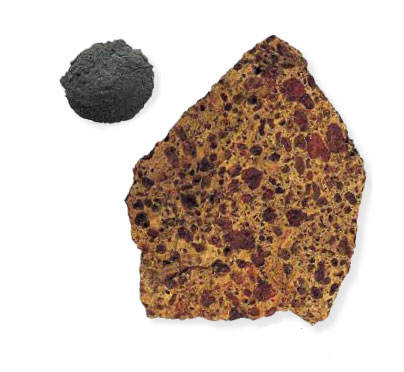Alumina
Aluminum oxydatum
Origin
Obtained from bauxite, a dense mineral that is predominantly found in Ghana, Jamaica, the US, France, Italy, Hungary, Indonesia, and Russia.
Background
Used as an antacid in indigestion remedies, and in cooking utensils. Controversially thought by some to be a factor in triggering the onset of Alzheimer's disease.
Preparation
Aluminum oxide crystals are extracted from bauxite using an industrial process. They are then triturated with lactose sugar, filtered, diluted, and succussed.
Common Names
Aluminum oxide, pure clay.
Obtained from bauxite, a dense mineral that is predominantly found in Ghana, Jamaica, the US, France, Italy, Hungary, Indonesia, and Russia.
Background
Used as an antacid in indigestion remedies, and in cooking utensils. Controversially thought by some to be a factor in triggering the onset of Alzheimer's disease.
Preparation
Aluminum oxide crystals are extracted from bauxite using an industrial process. They are then triturated with lactose sugar, filtered, diluted, and succussed.
Common Names
Aluminum oxide, pure clay.

ALUMINUM
The mineral bauxite is the main
source of aluminum, since it is composed
of hydrated aluminum oxides.
Key Symptoms
sense of feeling hurried and flustered; fatigue and sluggishness; failing memory; dryness of the skin and mucous membranes-
Significant amounts of aluminum absorbed into the body are thought by
some to cause the mental processes to slow down. Some evidence suggests
that it may aid the development of Alzheimer's disease. Sources of ingested
aluminum in humans may include drinking water, baking powder, food
additives, and indigestion remedies. Alumina, proved by Hahnemann and
published in his Materia Medica Pura (1821–34), is given chiefly
for sluggish states and dementia.
Remedy Profile
Alumina is best suited to those who are generally sluggish. They may be in a state of deep despair, and fear that something awful is about to happen. Fear of insanity is not uncommon, especially on sighting sharp objects and knives, which may even trigger suicidal thoughts. Reactions to external stimuli and questions are slow, yet despite this, these people often feel a sense of haste, hurry, and confusion.Typical physical symptoms include dry, gray skin and dry, sore mucous membranes. In addition, there may be a lack of coordination, weakness, and fatigue, possibly associated with chronic illness.
Alumina is typically used for elderly people who are senile and confused, with a poor memory. It is also suited to delicate babies. The remedy is given to treat fatigue, nervous complaints, constipation, and unusual food cravings.
Fatigue
Symptoms: Great weakness, sluggishness, and exhaustion. The skin is pallid, and the legs are heavy and tired, even when sitting. This weakness may be the result of chronic illness.Symptoms better: For damp weather; for moderate exertion; while eating.
Symptoms worse: For warm rooms; upon waking; for lying or sitting down.
Nervous disorders
Symptoms: Numbness, "pins and needles," a sensation of muscle paralysis and fatigue, and slow, weak movements. The extremities may become uncoordinated (locomotor ataxia), and the eye muscles may be affected, causing drooping eyelids and squinting.Symptoms better: For fresh air; in the evening.
Symptoms worse: For cold air; in the morning; for salty and starchy foods.
Dementia
Symptoms: Deterioration of mental processes leading to sluggish and absent-minded behavior. Those affected may forget who they are and feel as if they are talking, hearing, or smelling through someone else's senses. There is often a sense of being adrift from the body. Elderly people are most commonly affected. The remedy may be given to treat Alzheimer's disease.Symptoms better: For damp weather; in the evening; for moderate exertion.
Symptoms worse: For warm rooms; upon waking.
Constipation
Symptoms: Sluggish bowels or severe constipation. The rectum characteristically feels paralyzed, and great effort is required to expel even small, soft stools. Pregnant women, newborn babies, and children are most commonly affected. Alumina may also help elderly or sedentary people who have severe constipation and no urge to pass stools.Symptoms better: For fresh air; in the evening; for warm foods and drinks.
Symptoms worse: For cold air; for heat; in the morning; for salty and starchy foods.
Appetite disorders
Symptoms: A dry mouth and throat, with cravings for dry foods or inedible substances such as pencils, chalk, clay, tea leaves, and coffee grounds. The cravings appear to be for substances that actually contain aluminum.Symptoms better: For fresh air; in the evening; for warm foods and drinks.
Symptoms worse: For starchy, salty, or highly processed foods.
© 2024 KnowHomeopathy | All rights reserved